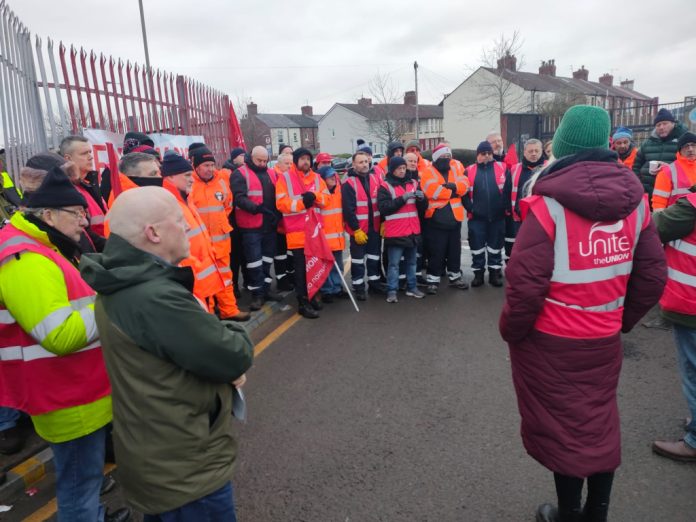Mount a fight for the funding we need
Dave Walsh, Liverpool Socialist Party
Unite the Union members who work for Liverpool Streetscene Services Ltd (LSSL) started a five-day strike on Monday 23 January over pay. LSSL is an arm’s length company, wholly owned by Liverpool Labour council. It provides refuse collection, street cleansing and grounds maintenance services.
The workers were offered the same settlement as local government workers, which is a £1,925 flat-rate, consolidated payment. But many of the workers are on a rotating shift pattern and are required to work weekends and bank holidays, which boosts their salary. Others have an HGV licence or are skilled workers. So the local government offer equates to 6-7%, well below the rate of inflation. And after years of funding cuts and real-terms pay cuts, there was no mood to accept another reduction.
Workers at LSSL were originally privatised under Blair’s Labour government, to a myriad of different contractors. Senior bosses and shareholders at these companies did very well, while the workforce suffered attacks on pay and conditions. In 2016, the Labour council brought them under one umbrella company, owned by the council, because they weren’t getting value for money from the contractors. But instead of bringing them back into direct employment – which we demand – they set up LSSL. This means many cannot join the Local Government Pension Scheme, creating a two-tier workforce.
Unite members are a minority at LSSL, with about 60 members. The GMB union is much larger, with over 600 members, but the local GMB leaders recommended acceptance of the pay offer.
Management have tried to exploit this situation, moving vehicles away from the main depots in Liverpool to avoid picket lines and keep the operation moving. But many GMB members have been unwilling to do anything that undermines the strike. Unite pickets were posted to where they were needed as soon as they got information on management tactics.
The strikers also organised protests outside the town hall at a Labour group meeting, and then two days later at a full council meeting where they expressed frustration with the Labour council for their lack of support. Many council workers are angry that government commissioners have been sent to the city to oversee the implementation of £73 million of cuts this year.
The Tories’ excuse for sending commissioners to Liverpool was based on Max Caller’s report on council corruption, but this comes from a government bogged down by sleaze and corrupt cronyism, and this hasn’t been lost on the people of the city. If Labour made this argument and fought against Tory cuts, they could build a massive working-class movement in Liverpool, as Labour did in the 1980s when it was led by the Militant Tendency.
Since 2010, when Labour took control in Liverpool, they have cut over £450 million from the city’s annual budget. They have slashed vital frontline services like SureStart Centres, youth services, libraries and social services, destroying 7,000 jobs in the process. So it’s not a surprise that they are sitting on their hands while these latest cuts are implemented.
However, a small group of Labour councillors broke the whip, refusing to vote through further cuts. They have been expelled or left the party. These councillors have now committed to stand as independents, and they have held discussions with Trade Unionist and Socialist Coalition (TUSC) activists to avoid standing against each other.
The government has also changed local ward boundaries to reduce the number of city councillors, and all councillors will be up for election this year for a four-year period instead of elections each year for a third of wards. A number of Labour councillors have been told they have not been selected as candidates. Not surprisingly the ones who have been selected are the most reliable for the party leadership.
A political vacuum exists in the city which can only be filled by building a mass workers’ party with a programme of socialist policies capable of resolving the many crises faced by working-class people. Anti-cuts candidates in the local elections, pledged to fight for the funding for jobs, pay and services we need, will be a step along that road, and give a political voice to striking workers.








